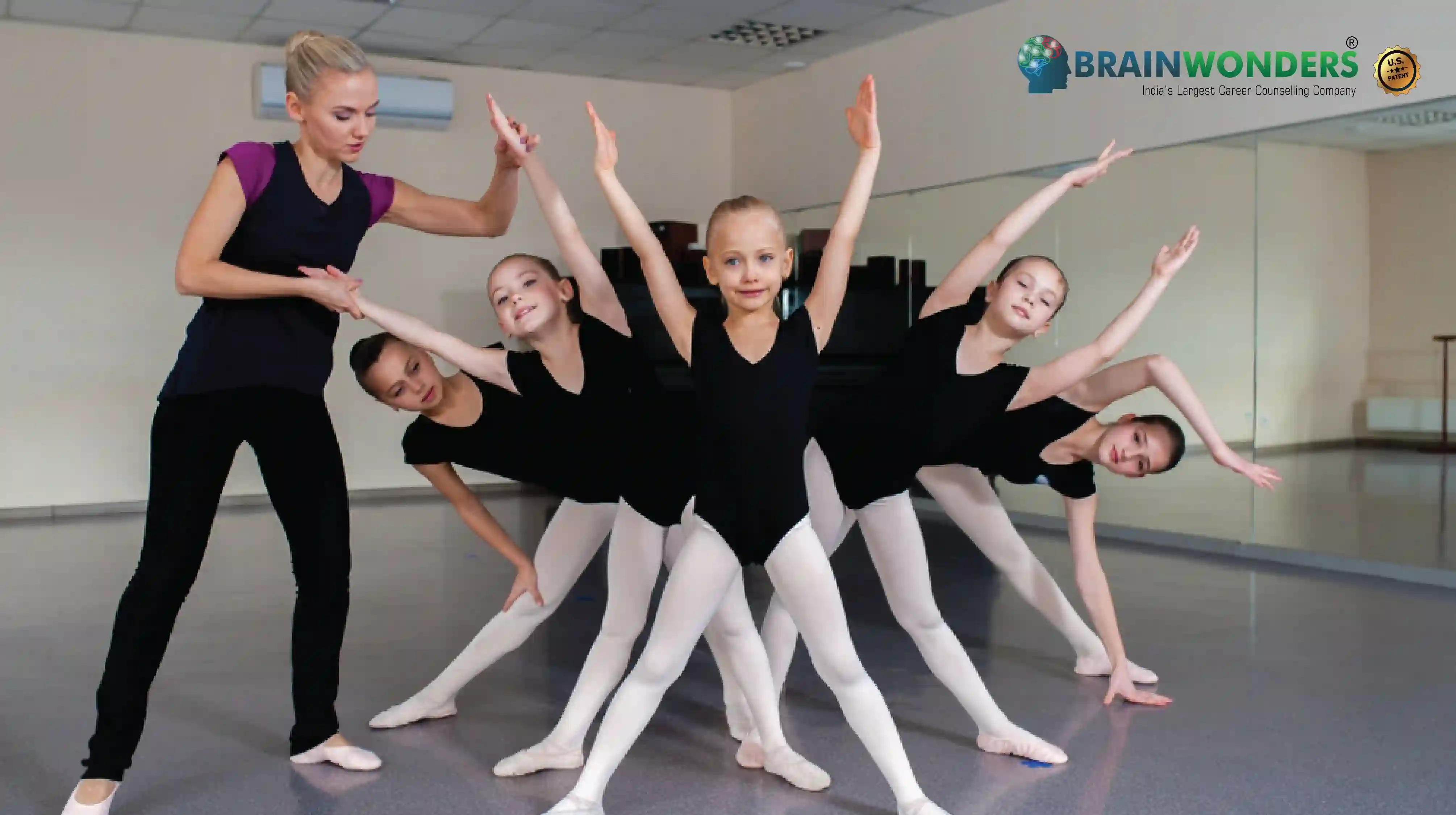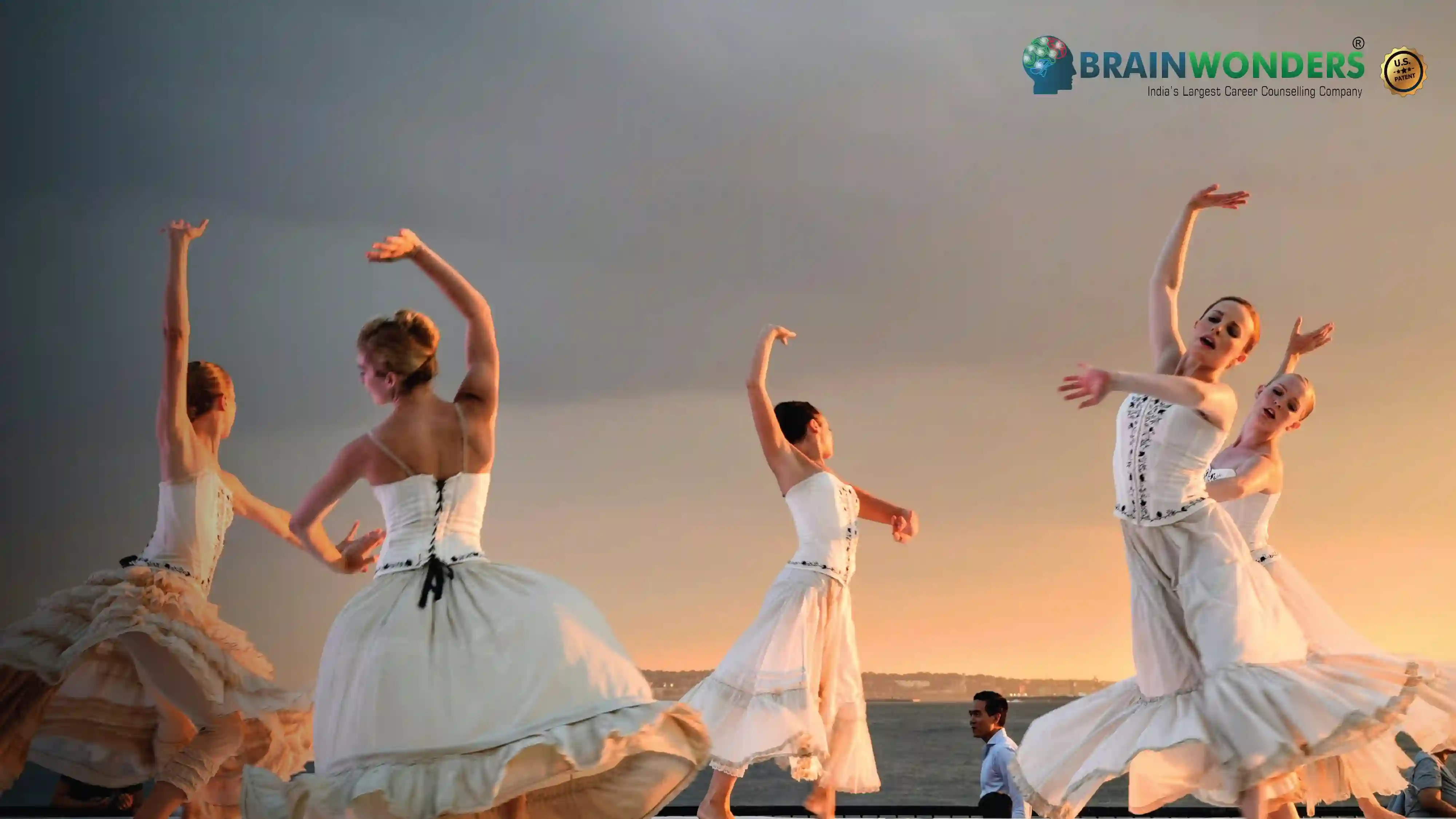How to become a Choreographer
Overview, Courses, Exam, Colleges, Pathways, Salary

Overview
Who is Choreographer ?
Choreographers are specialists who design and prepare dance routines for use in dance performances and plays. They are also known as dance designers. choreographers are often experienced dancers who prepare dance routines for performances on stages, television and music videos. They may also create dance routines for other occasions such as ceremonies, fashion shows, and corporate activities. This comprises the creation of novel dance routines or the adaptation of existing routines in line with the production director`s specifications. They strive to communicate ideas, emotions, and tales via the use of finely choreographed movements.
It is common for them to specialise in a certain type of dance, such as Indian classical dance forms such as Kathak, Odissi, and Bharatnatyam; classical ballet; modern dance forms such as jazz or hip-hop; or ballroom dancing such as salsa, to mention a few examples. A choreographer`s goal is to communicate a variety of emotions and ideas to their audience via the creative assembly of individual movements into artistic dance routines and the combination of these routines with compelling music. It is also possible to learn dance routines from them if you are not a skilled dancer or performer.
Typical day at work
What does Choreographer do?
- Create dance routines for a production or performance
- Choose the background music, sound effects, or spoken narrative to complement the dance performance
- Match the dance steps to the lyrics and rhythm of the music and underlying themes of the performance
- Demonstrate dance steps to the dance performers and explain the dance sequence
- Instruct the dancers on how to perform the steps in the dance routine and help them practice their movement
- Provide constructive feedback to the performers regarding their dance movements, facial expressions, postures
- Supervise rehearsals to assess students' dancing abilities
- Train, exercise, and attend dance classes to develop skills and physical fitness
- Study new dance techniques or forms, practice to perfect own skills, and stay in tune with the emerging trends
- Coordinate with the other professionals for costume designing, lighting, casting, and stage setup
- Attend promotional and networking events
Abilities and Aptitude needed
What are the skills, abilities & aptitude needed to become Choreographer?
To be a successful choreographer, patience and dedication are essential in order to continuously train and improve their abilities throughout their career. In order to offer precise directions to the dancer/s and to coordinate costume design, music, and lighting, they need have outstanding communication and interpersonal skills. They should also have a positive attitude. They must have the physical endurance, spatial orientation, and physical dexterity necessary to maintain their dance ability over an extended period of time. They also need a good memory in order to recall intricate dance routines that they have learned via practise.
Additionally, great time management and organisational abilities will be necessary of a choreographer in order to properly manage their calendars in collaboration with the schedules of the dancers and other professionals as required. Their leadership talents must be strong so that they can educate their students and assist them throughout rehearsals. In their approach, they should be imaginative, and they should have the artistic capacity to portray their thoughts via movement by devising intriguing dance routines. They must be very detail-oriented as well as emotive in order to produce dance works that are both emotionally expressive and impacting on the audience.
Salary
Salary for Choreographer?
The minimum and maximum monthly salary and annual salary of a "Choreographer" can vary significantly based on factors such as experience, expertise, the type of projects they work on, their reputation, and the location of their work.
- Minimum Monthly Salary: The monthly salary can be from INR 15,000 to INR 30,000.
- Maximum Monthly Salary: The monthly salary can be from INR 1,00,000 to INR 2,50,000 or more.
- Annual Salary: The annual salary can be from INR 1,80,000 to INR 30,00,000 or more.
- Highest Paying Job and Scope: The highest paying job for a Choreographer is often in top-level positions within the entertainment industry, such as working with high-profile production houses, major film projects, or renowned dance companies. The scope for Choreographers can be diverse, with opportunities in various entertainment sectors, including film, television, music, theater, fashion, and corporate events.
Pathways
How to become an Choreographer?
Entrance Exam
Entrance Exam for Choreographer ?
Courses
Which course I can pursue?
Best Colleges
Which are the best colleges to attend to become an Choreographer?
Industries
Which Industries are open for Choreographer?
Choreographers can work in various industries involving dance and performance arts. Here are some industries open for choreographers:
- Performing Arts Companies: Professional and theater companies often employ choreographers to create original dance routines and choreograph performances for their productions.
- Film and Television: Choreographers are needed in the entertainment industry to design and coordinate dance sequences for movies, TV shows, music videos, commercials, and other visual media.
- Dance Studios and Schools: Many dance studios and schools hire choreographers to teach dance classes, design dance routines for students, and prepare them for competitions or performances.
- Event Management and Entertainment Companies: Companies involved in organizing events, shows, and entertainment productions may require choreographers to create dance performances and coordinate dance-related aspects of the event.
- Theme Parks and Cruise Ships: Theme parks, amusement parks, and cruise lines often have entertainment departments that hire choreographers to create and oversee dance performances for guests.
- Dance Festivals and Workshops: Choreographers are frequently invited to participate in dance festivals and workshops, where they may teach dance classes, showcase their work, and collaborate with other dancers.
- Fashion and Commercial Industry: Some choreographers work in the fashion and commercial sector, choreographing dance routines for fashion shows, product launches, and promotional events.
- Educational Institutions: Colleges, universities, and schools with dance or performing arts programs may employ choreographers as faculty members to teach dance courses and direct dance productions.
- Corporate Events and Functions: Some corporations and businesses hire choreographers to create dance performances for their corporate events, product launches, and promotional activities.
- Independent Choreography Projects: Choreographers may also pursue independent projects, collaborating with artists from different disciplines, creating dance productions, and showcasing their work in various venues.
internship
Are there internships available for Choreographer?
Internship opportunities for a Choreographer may be available in various settings, depending on the specific focus and goals of the choreographer.
- Dance Companies: Professional dance companies may offer choreography internships where aspiring choreographers can work with experienced mentors, learn about choreographic processes, and contribute to developing dance productions.
- Dance Studios: Dance studios may offer internships to individuals interested in choreography. Interns may assist in creating dance routines, teaching dance classes, and working with students on choreographic projects.
- Performing Arts Centers: Some performing arts centers or theaters might have internship programs that involve collaborating with choreographers working on upcoming productions.
- Educational Institutions: Universities, colleges, or schools with dance or performing arts programs might offer internships for choreography students to gain practical experience creating choreography for various dance styles.
- Event Management Companies: Companies organizing events, shows, or productions that require choreography might have internships available for aspiring choreographers.
- Film and Television: In the entertainment industry, choreographers are often needed for dance sequences in movies, TV shows, music videos, and commercials. Interning with production companies or dance coordinators can provide valuable experience.
- Dance Festivals and Workshops: Dance festivals or workshops may have internship opportunities where individuals can work with established choreographers, assist in organizing events, and gain exposure to various dance styles.
Career outlook
What does the future look like for Choreographer?
Choreographers often begin their careers as dancers before transitioning into their current position. They may be self-employed or even work solely for a certain band, symphony, or dance group, among other options. They are not required to work normal hours since the most of their instructional efforts take place during the day and the majority of their performances take place in the evening. They also often work on weekends and holidays, depending on the nature of the project or the needs of the customer. These professionals may be found in a variety of settings such as dance companies, dancing schools, theatres, as well as the musical theatre and film industries. These individuals collaborate with the music directors, the production director, the stage managers, and all other members of the cast and crew of the show.
Many choreographers opt to open their own dance schools after obtaining widespread acclaim for their work and acquiring valuable industry experience. Read on for more information. Self-promotion is essential for people who want to operate on a freelance basis in order to achieve success. Some of the projects on which they work include dance productions for television or film performances, music videos, advertisements, fashion presentations, wedding ceremonies, and corporate events, among other things. In addition to being expert dancers themselves, choreographers might opt to train as dance movement therapists, allowing them to use this kind of art for therapeutic reasons.




.webp)
.webp)

